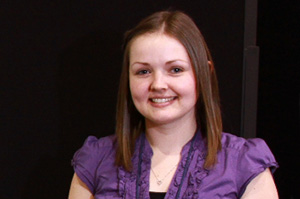UOIT Nuclear Engineering student awarded prestigious scholarship from U.S. foundation
April 3, 2013

Through her Nuclear Engineering studies in the University of Ontario Institute of Technology’s (UOIT) Faculty of Energy Systems and Nuclear Science (FESNS), Shona Draper has become just the second Canadian ever (and second UOIT student) to receive a Roy G. Post Foundation Undergraduate Scholarship.
Draper was one of four recipients presented with the award during a ceremony February 26 in Phoenix, Arizona. Full-time students enrolled in post-secondary educational programs in technical or policy fields with the objective of contributing to the safe management of nuclear materials are eligible for these scholarships. They are awarded in memory of Dr. Roy G. Post who created the foundation’s annual Waste Management Conference.
"This is remarkable accomplishment for Shona to distinguish herself in such a way against such a large field of international applicants,” said Dr. George Bereznai, Dean, FESNS. “We are proud of Shona’s achievement which speaks to the outstanding hands-on opportunities we provide students and how our technology-enriched learning environment is preparing them to lead and excel in the workplace.”
Draper’s final-year thesis project is on the design of selected systems for a centralized radioactive waste management facility. She presented a poster on the first-semester group project (on behalf of her teammates Krista Nicholson and John McDonald) which established the requirements for the facility. The poster was separate from the scholarship.
“The Waste Management (WM) Conference in Phoenix was an amazing chance to meet with peers, mentors and industry professionals from all over the world,” said Draper. “This scholarship is a tremendous honour and a wonderful way to cap off my undergraduate studies at UOIT. I must acknowledge the contributions and support of my teammates Krista and John without whom I would not have had the research to share in Phoenix. At the same I wish to thank my faculty co-supervisors Dr. Brian Ikeda and Dr. Igor Pioro for their advice throughout my thesis research help in preparing for the conference.”
After graduating at this June’s convocation ceremonies, Draper will start her career at the Canadian Nuclear Safety Commission, where she will be working in the Wastes and Decommissioning Division in Ottawa, Ontario.
Draper is the second UOIT recipient of this scholarship. In 2010, Jessica O’Brien, a UOIT Bachelor of Health Sciences student became the first Canadian university student to receive a Post Foundation scholarship.
The WM Conference was first held in 1974 in Tucson, Arizona. It was sponsored by the University of Arizona to assist the U.S. Department of Energy in the management of high-level radioactive waste. Since then, it has expanded to other areas of radioactive waste and radioactive material management. It is widely regarded as the premier international conference for the safe management of radioactive material and related topics.



